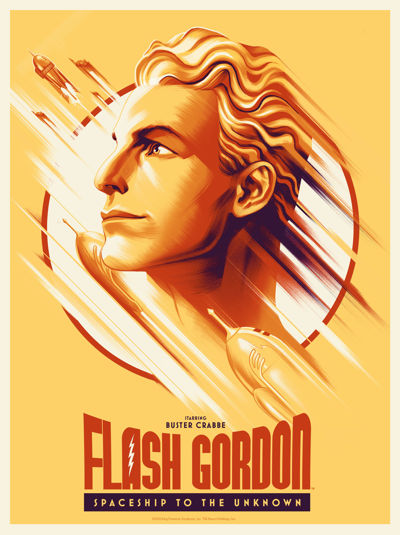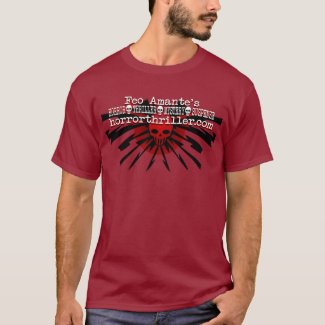 |
 |
Review by E.C. McMullen Jr. |
|
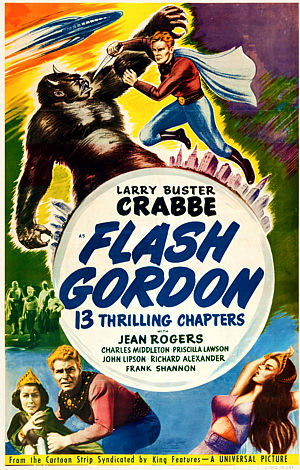
USA Release: April 6, 1936 Universal Pictures Rated: N/A |
|||
There are those who believe that all of cinema, good and bad, deserves to be preserved as a historical archive.
Well, I'm not of that mind-set but, more power to them.
One of the reasons I feel this way can be summed up by movies like the original FLASH GORDON of 1936.
They were seriously cheap and I don't mean just the budget. I can rattle off plenty of extraordinarily low budget movies that transcended their budget to become true classics of cinema.
I don't know of anyone who would feel that way about FLASH GORDON IF they had to sit through them, but this is - so far - the only serial preserved by the Library of Congress (1996).
The movie serial begins with a couple of astronomers by their massive Observatory telescope, accepting their doom. A rogue planet approaches earth and there is nothing humanity can do to stop it.
Professor Gordon (Richard Tucker: THE WOMAN IN ROOM 13, A VOICE IN THE DARK, THE DUMMY, THE GREEN GHOST, THE BAT WHISPERS, HELL BOUND, THE DEVIL PLAYS) is somewhat comforted by the knowledge that his son, famous Polo Player Flash Gordon (Larry Buster Crabbe: BUCK ROGERS, Fred Olen Ray's THE ALIEN DEAD), is flying in so they may face the end together.
While Flash rides that plane, one of the passengers, a young woman, catches his eye. He doesn't have time to work up the nerve to approach her before the pilot steps out of the cockpit to calmly tell everyone that, thanks to the "forces" caused by the approaching rogue planet, they'd be better off parachuting out of the plane than hoping to survive the landing. Having already prepared for this potential scenario they all have parachutes under their seats.
Wow! Talk about Airline service!
When the pretty woman hesitates before jumping, Flash takes charge and pushes her out before taking the leap himself.
Safely on the ground, they don't have a chance for introductions before a suspicious character with a gun threatens them for being on his property.
Now the introductions are made. Besides Flash, the woman is news reporter Dale Arden (Jean Rogers: MYSTERIOUS CROSSING, NIGHT KEY, THE STRANGE MR. GREGORY, BACKLASH) and the gun toting guy is Doctor Hans Zarkov (Frank Shannon: THE BATMAN [1943], THE PHANTOM [1943]).
Dr. Zarkov is aware of who Flash Gordon is. Why, he's that Polo Playing son of a bitch Professor Gordon! The famous astronomer who thinks Zarkov is mad (MAD, I tell you!)!
Why mad?
Because Zarkov doesn't believe that the planet about to destroy earth is rogue. He doesn't believe all of these crazy attacks are natural, but artificially controlled in some way. What way? Well, the only way they are going to find out is by getting in Zarkov's home-made spaceship and flying to the rogue other planet.
Earth is about to be destroyed anyway so, sure you mad scientist you, let's jump in your DIY project and fly to another freaking planet.
Will we even be able to breathe the air there? Oh, why waste time worrying about that? Let's go!
Spaceship effects ensue and, compared to the competition from the silent 1927 picture, METROPOLIS, to Universal's 1931 FRANKENSTEIN, to the 1933 RKO flick, KING KONG, and Universal's 1933, THE INVISIBLE MAN, there's nothing special about Universal Picture's FLASH GORDON effects - though Carl Laemmle Jr.'s studio was clearly capable of creating them.
They land on the planet, watch a lizard fight, get captured by Emperor Ming's minions, and are hauled off to his castle, where Emperor Ming (Charles Middleton: THE BLACK RAVEN, STRANGLER OF THE SWAMP) of the planet Mongo, takes great delight in being a total douche. Spoiled brat Flash can't figure out when to keep his mouth shut and let Dr. Zarkov negotiate a better alternative than earth's annihilation. Ming's daughter, Princess Aura (Priscilla Lawson: the best role she ever had and she Nailed it!) is overwhelmed with lust for the blond, brash earthling who doesn't put up with her Pop's bullshit.
Yes, lust.
Let's not 1936 kid ourselves. There is nothing in Aura's behavior that so much as sighs Romance. No, she wants Flash in the most physical way, as soon as possible, and she's not subtle about it either. But Dad's being a dick, as he's also too distracted by anything other than his abrupt desire to marry Dale who, in the midst of so much rapid-fire craziness all at once, Can't Even!
I think I just made this show appear more entertaining than it actually is.
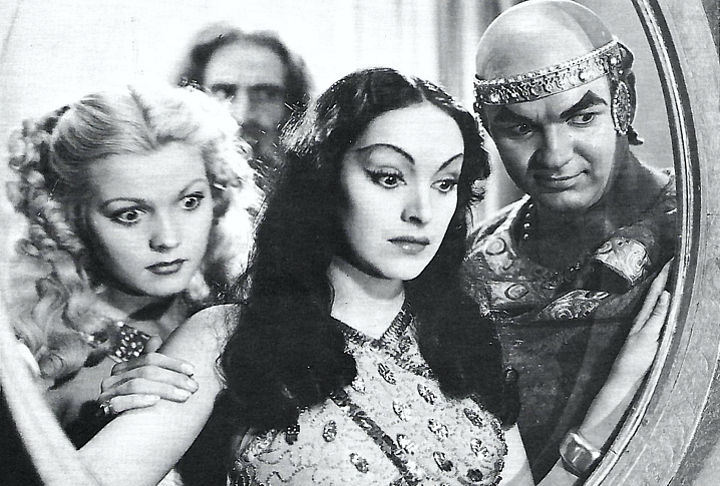
Flash Gordon's insanely brave death-defying feats of derring do
makes all the gals (and a few of the guys) Moist!
Universal could have done better, they just didn't care. But why? They paid for the rights to a popular newspaper comic strip, ten a fortune - during the Great Depression, mind you - for promotion. The serial was based off of a popular newspaper comic strip by Alex Raymond and from the start, made for kiddie matinees.
Carl Junior did something his Pop would never do: He took on debt. With the company already in receivership, Junior took a loan from Standard Capital Corporation. He should have paid attention to the fine print. SCC didn't want their loan repaid, they wanted Universal Pictures for pennies on the dollar, and they got it through highly suspicious (bordering on fraud) loopholes in the laws of that era.
In the midst of production, SCC went on a budget slashing spree.
So when it unexpectedly took off, Universal under new ownership, and already drowning in the success of its immense library of literary best-selling monster movies, was left wholly unprepared. Their best talent was guiding their DRACULA, FRANKENSTEIN, INVISIBLE MAN, and whatever other monster they could throw into the mix. And yet, the damn serial - 13 features in all made for around $350,000 total - was Universal's second biggest box office blockbuster in 1936, right after Universal's musical Three Smart Girls (remember that one? Nobody does.).
Standard Capital Corporation, having no clue of the movie Business, yet considering themselves shrewd movie experts all the same (after all, they'd just fleeced the powerful Laemmle family!), put a hapless dolt in charge of it all and the best he could do was smudge the whole studio into a crumbling mess of debt until SCC was forced to sell it, keeping their foul mitts off of it forever.
Okay, but what the hell was the selling point in all of this chaos?
Larry Buster Crabbe was a former Gold Medal Olympian who Junior hoped could compete against the more popular Olympian (more Gold medals) Johnny Weismuller. They'd both played Tarzan but Johnny at Metro Goldwyn Mayer played him first and better (despite the smaller studio making Crabbe's loincloth more revealing). Weismuller took the role from Buster when the rights moved to MGM, making Larry second rate.
Mobster movies, Jungle flicks, and shitkickers (Westerns) were all the rage then and even the cheapest, most Poverty Row shlock-meisters could get in on the action without leaving the county.
Larry Buster Crabbe might have disappeared except for,
1. Alex Raymond's daily comic strip was more popular than any Western or Jungle comic strip and that included the Jungle Superhero, THE PHANTOM.
2. The young audience, nurtured through those fresh early years by the leadership of Carl Jr.'s Universal pantheon of monsters, with SciFi FRANKENSTEIN at the forefront, are likely the ones who embraced FLASH GORDON, forcing the bank owned Universal to make a mad scramble rush into a second serial (it's beneath our dignity, but its financially sound). There! Now we're done with it. Then a second mad scramble to make a third when Orson Wells infamous 1938 radio show startled the nation. SCC Universal had a cash cow and apparently despised it (on the one hand, I own the water rights on my land. On the other, the water is no good because the well we drilled is full of oil!).
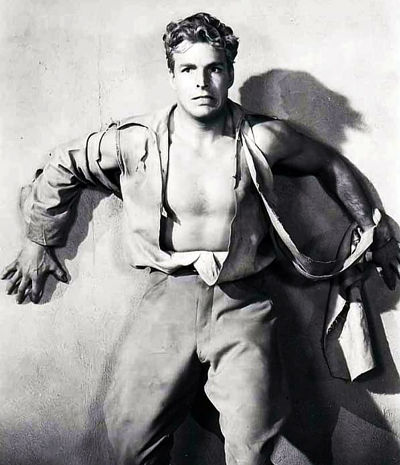
How to explain the appeal? Well maybe because the teen gals had Buster and his bulge...
Universal didn't have their Tarzan, but they had something surprisingly popular in Crabbe (and these weren't typical of Hollywood's pot of marketable names, mind you. Weismuller? Crabbe?). No one else had this Golden Goose, but damn if the bank owned Universal could figure out what to feed it. So they bought the rights to the only other popular SciFi comic strip of the era, BUCK ROGERS, and made Larry the hero in that one too.
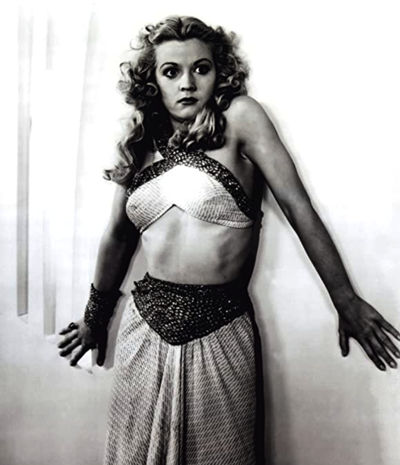
...while the teen guys had Jean Rogers and her fabulous... ahem!
The censorous happy Hays Office (the "Woke" of its day) was having fits!
And that serial also became a hit! By the time Larry retired his role as Flash in 1940's FLASH GORDON CONQUERS THE UNIVERSE, he did so unchallenged. Larry spent the rest of the 1940s making Western serials. Not until 1949, nearly ten years after Larry left his spaceship for good, did a single studio, Republic Pictures, attempt a Space Opera serial with ROCKET MEN TO THE MOON (which, to their happy surprise, also became a hit).
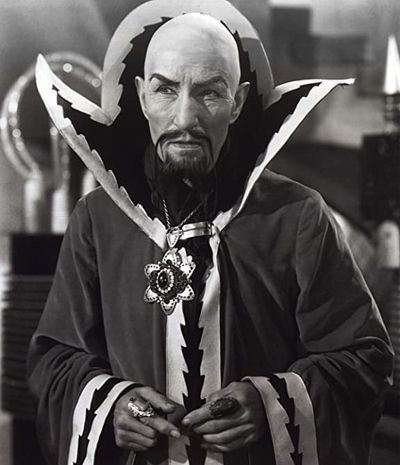
And as for this guy, well... F* this guy! Freaking Ming!
Yet I look at these movie serials today and I ask, Why?
I'm not asking why FLASH GORDON and BUCK ROGERS endured when all of the Westerns and Jungle movies did not. That feels obvious to me. Westerns and their 40 year slice of American history (from the 1860 birth of the Pony Express, through the 1869 Transcontinental Railway to 1900 and the definite start of the auto industry) had nowhere to go but fade into history, while the Space Operas would always represent our future.
TRIVIA How did Johnny Weismuller and Larry Buster Crabbe keep their UN-Hollywood names in an era where studios regularly assigned fictional names to their stars? It's that whole Gold Medal Olympiad thing: Johnny and Larry already had fame and recognition - a brand - before they started acting. And Flash Gordon was there in silver underwear. |
By the time of the explosive growth of cinema theaters in the 1920s, Westerns, despite their romantic notions, were overwhelmed by a burgeoning aircraft industry as well. At the height of Western and Jungle movie popularity, in the 1930s (and despite the Great Depression), America had a transcontinental railway, aircraft routes, and a highway for autos and trucks as well. Even the bad guys had to embrace advancing technology by robbing trains over banks. The U.S.A. was too busy looking forward to cling to the past for long.
No, the reason I'm asking why, in an era when Science Fiction movies were being made and done so much better, did the worst cheap seat cinema with bad sets, awful effects, numbskull scripts (Frederick Stephani and Ella O'Niell), terrible actors, and direction (Frederick Stephani again) become popular enough to compete with the best?
Apparently this perplexed Larry Buster Crabbe in his later years as well. He had no illusions about his acting ability or anything else in his old SciFi spectacles. Instead he was amazed that his popular longest running shitkicker serials - made when he was a more experienced actor - were forgotten In His Life Time, while FLASH and BUCK lived on to inspire STAR TREK, STAR WARS, 1980 FLASH GORDON (which Crabbe did not like), as well as various other SciFi TV shows of the 1970s and early 1980s (Larry died in 1983).
Some things are simply a different era. There are many Comic actors of the 1930s who, as wonderful and generous a human being as they were in real life, can't raise a smile on my face with their decades of "Catchphrases", some nothing more than a single sound. Joe E. Brown and his siren yell comes to mind. How on earth did people think that was so funny for so long? Joe made a life-long career out of that!
Recall what I mentioned earlier? A single radio show ushered in a new era in 1938 after the infamous Orson Wells radio show of H.G. Well's WAR OF THE WORLDS. Suddenly Universal wanted Crabbe back to do another serial, only this time forget the planet Mongo, we're going to Mars!
This same Flash Gordon serial was re-edited into a single 72 minute movie called FLASH GORDON ROCKET SHIP to be sold in foreign markets by Producer and movie distributor, Sherman S. Krellberg's company, Filmcraft. Sherm was mad for the Science Fiction.
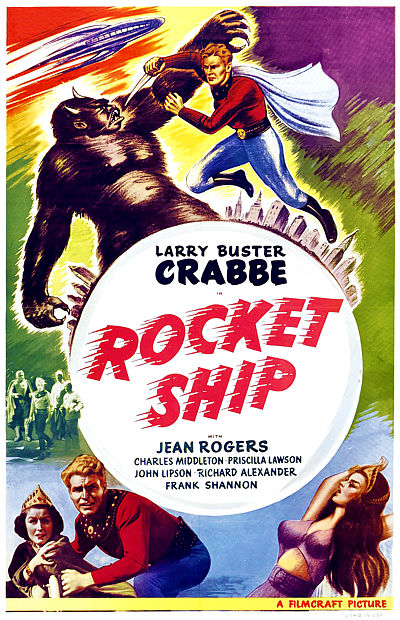
Then in 1966 the serial was re-edited again for a single 90 minute movie called FLASH GORDON: SPACESHIP TO THE UNKNOWN. This is the what I saw and what I'm reviewing here. If what I saw is what they let in, I dread to think of what they cut out.
In 2017 with the clean up and digitizing of Buster Crabbe's FLASH GORDON serials, Lionsgate commissioned a poster for them that won the Bronze Clio award. Amazon uses them to represent their streaming of the FLASH GORDON serials, which are so valuable that they charge for them even if you do have a Prime subscription.
It's these posters which have re-re-reignited interest in these serials, which have spent nearly a century o having a slow and steady pulse that attracts new generations to them. I'd like to think this too will find its audience.
That audience won't be me but I can't deny its historical significance.
Alex Raymond's FLASH GORDON comic strip is still a fascinating marvel to read, but as for the movie serial turned motion picture, 2 Shriek Girls.


This review copyright 2022 E.C.McMullen Jr.

|
| CHANGE YOUR SHIRT | |
| YOU MIGHT ALSO LIKE | ||
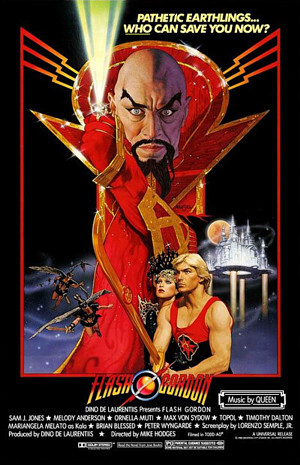 |
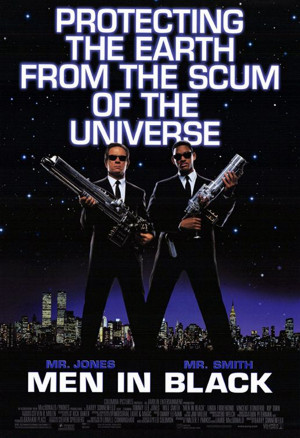 |
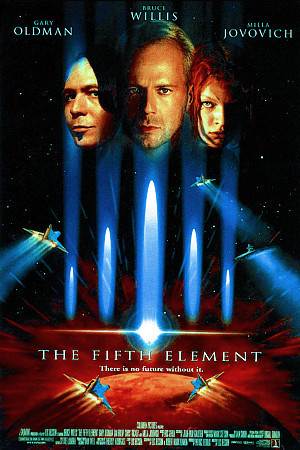 |
| FLASH GORDON - 1980 MOVIE REVIEW |
MEN IN BLACK MOVIE REVIEW |
THE FIFTH ELEMENT MOVIE REVIEW |
| FEO AMANTE'S HORROR THRILLER Created by: E.C.MULLEN JR. |
| COME FOLLOW ME @ Amazon |
| ECMJr |
| Feo Blog |
| IMDb |
| Stage32 |
| YouTube |
| Zazzle Shop |
